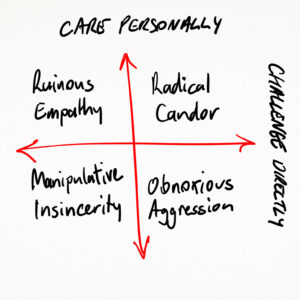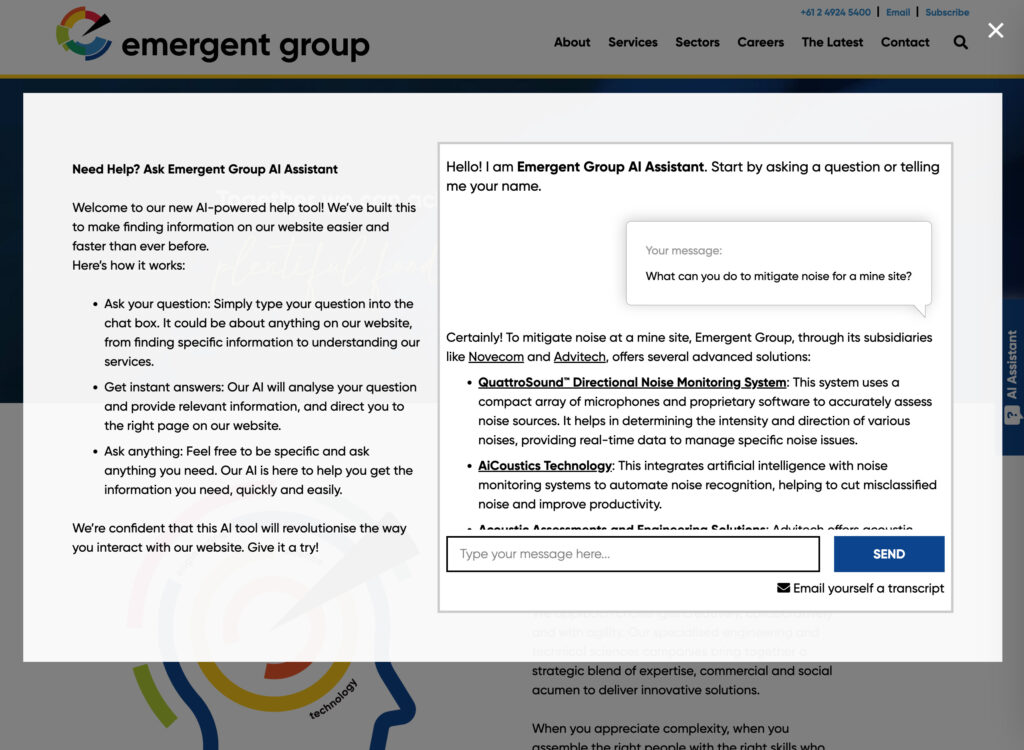Management and leadership aren’t just about steering the ship—it’s about creating a culture where the individuals in your team can thrive, the whole team can excel, and together achieve outcomes that exceed expectations.
The book, ‘Radical Candor: Be a Kick-Ass Boss Without Losing Your Humanity,’ by Kim Scott offers a reference for leaders of high-performing teams and their leaders in how to manage people effectively toward successful outcomes for both the individual and the organisation.
The Essence of ‘Radical Candor’
“At the heart of Radical Candor is the simple idea that to be a good boss, you have to Care Personally at the same time that you Challenge Directly,” states Scott. This double-edged sword is the fundamental premise of the book: the power that effective communication and authentic concern have on working relationships that achieve goals. ‘Radical candor’ is the skill of saying what you think while also considering your team member’s best interests and effectively challenging them to improve. At first, it sounds like it is about being blunt and having courageous conversations, but instead, it is about being very sincere in trying to give others a lift whilst being constructive and honest.
Understanding the Four Quadrants
 To implement ‘radical candor’, Scott introduces a model depicting four communication styles:
To implement ‘radical candor’, Scott introduces a model depicting four communication styles:
- Radical Candor: High in both care and challenge, this is the sweet spot where powerful, personal connections are forged through impactful discussions that solve problems.
- Obnoxious Aggression: Low in care, high in challenge. It’s characterised by speaking the truth without regard for the recipient, often resulting in damaged relationships and morale.
- Ruinous Empathy: High in care, low in challenge. While intentions are nice, reluctance to confront issues leads to subpar performance and unhelpful behaviour is going unaddressed.
- Manipulative Insincerity: Low in both care and challenge, this quadrant represents the most damaging style. It’s marked by superficial niceties that mask critical feedback and undercuts trust within a team.
Striving for ‘radical candor’ means consistently aiming for the first quadrant while avoiding the pitfalls of the latter three. It signifies a commitment to building an environment of vigorous discussion and mutual support, which, in turn, fosters innovation and growth.
It takes the four quadrants and builds on it into implementation strategies include a feedback framework. This framework is about delivering feedback that is:
Immediate: Timeliness is key; don’t wait for formal reviews to provide significant feedback.
Public when Praise, Private when Criticism: Publicly recognising achievements bolsters morale, while criticisms can be more effectively addressed one-on-one.
In person, if Possible: Face-to-face dialogues ensure the message is heard clearly, without the detachment of digital communications.
I’ll leave more for readers to discover for themselves except to say that it builds on the foundational quadrant, and the feedback framework with practices we master, habits we should build, and fears we need to overcome, in order to continuously improve a ‘radical candor’ leadership style.
The book gives practical examples, use cases, and communication strategies that feels like you are being coached as you read. It can be referred to in preparation for many examples of workplace communications. For example, how to deliver negative feedback so it isn’t a “shit sandwich”.
Radical Candor is more than a management philosophy; it’s a call to action for leaders to inject warmth, truth, and challenge into their communication. The book stands as a testament to the power of sincere, direct feedback in nurturing professional and personal growth, and it’s a must-read for anyone seeking to improve their management style.
It makes a lot of sense, but it is a challenge. It is for me. I will admit I find the more confronting conversations we face in business quite difficult. However, I’m willing to take on the challenge of radical candor. With small, continuous acts of care and direct, honest engagement the results can only be positive and for the greater good. At the end of the day, isn’t that what we all strive for—to be the best bosses without losing our humanity?
Note: I have maintained the American English spelling of candour given it is in the name of book, even when it is used on a the context of a sentence about candour itself.




